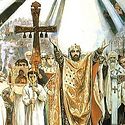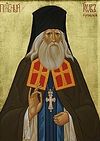

| Previous day | Next day |
| Old Style
July 15
|
Sunday |
New Style
July 28
|
| 5th Sunday after Pentecost. Tone 4. | No fast.
|
Commemoration of the Holy Fathers of the First Six Ecumenical Councils. ![]() Martyrs Cyricus (Quiricus) and his mother Julitta, of Tarsus (ca. 305).
Martyrs Cyricus (Quiricus) and his mother Julitta, of Tarsus (ca. 305). ![]() Holy Equal-to-the-Apostles Great Prince Vladimir (Basil in holy baptism), enlightener of the Russian Land (1015). Synaxis of the Saints of Kiev.
Holy Equal-to-the-Apostles Great Prince Vladimir (Basil in holy baptism), enlightener of the Russian Land (1015). Synaxis of the Saints of Kiev.
Commemoration of the Baptism of Rus’ (988). Martyr Abudimus of the isle of Tenedos (4th c.). St. Sylvester, bishop of Kanev (1908) Sts. Vladimir and Agrippina, prince and princess of Rzhevsk (ca. 1226).
St. Asiya the Wonderworker, of Tanis in Syria (5th c.). St. Donald of Ogilvy (ca. 716) and his nine virgin daughters, nuns of Abernathy (Scotland). Translation of the relics of St. Swithun, bishop and wonderworker, of Winchester (971). Finding of the head of St. Matrona of Chios (1462). St. Zosima, monk, of Alexandrov (Vladimir) (c. 1713). St. Job (Kundrya), archimandrite, of Malaya Ugolka (Carpatho-Russia) (1985). New Martyrs of Velic and Gornepolima (Serbia) killed by the Nazis (1943).
Thoughts for Each Day of the Year
According to the Daily Church Readings from the Word of God
By St. Theophan the Recluse

Fifth Sunday after Pentacost. [Rom. 10:1-10; Matt. 8:28-9:1]
The Gadarenes saw the Lord’s wondrous miracle, when He cast out a legion of devils, and yet, the whole city came out and besought the Lord that He would depart out of their coasts. We do not observe them relating hostilely to the Lord, but neither to we observe any faith in them. They are seized with a sort of indeterminate fearfulness, making them to desire only that the Lord pass them by, wherever He wishes, “only do not touch us.” This is a true image of people who live in peace with their possessions. An order of things has formed around them which is not unfavourable; they are used to it, they have neither thoughts nor the need to change or reverse anything, and they fear to make a new step. They feel, however, that should a command come down from above, the fear of God and their conscience would force them to renounce the old and accept something new. Therefore, they strive to avoid any circumstance which might lead them to such convictions, that they might continue living quietly in their old habits, pleading ignorance. These are the sort of people who are afraid to read the Gospels and patristic books, or to discuss spiritual matters. They fear that if their conscience be thereby disturbed, it might wake up and start forcing them to abandon what they had, and take up something else.
Articles
 St. Sylvester, Bishop of KanevHis contemporaries note that in him they saw the ancient ideal of a saint—both a teacher of faith and a model of true piety. |







